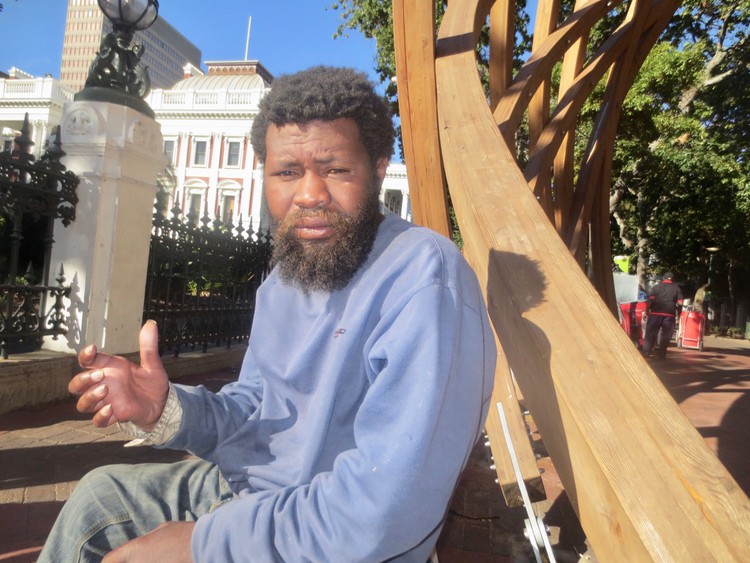
Vusimuzi Cele is homeless and sleeps outside Parliament. Photo: Tariro Washinyira
27 February 2018
In his reply to the State of the Nation address on 20 February, President Cyril Ramaphosa said, “We are building a nation where our greatest concern must be those in society who have least … The most important people in this country are not those who walk the red carpet in Parliament, but those who spend their nights on the benches outside its gates.”
GroundUp spoke to three of those who spend their nights on the benches outside Parliament. None of them knew that Ramaphosa had spoken about them, or that he was delivering the address, or that he was president.
Morné O’Brien, 33, was born in Mitchells Plain. He has been sleeping outside Parliament for four years.
As the sun rose around 6:30am on Sunday 25 February, O’Brien and two other men, Faiekco Marienis and Rashaad Abriehams, were packing up the makeshift bed which they share, made from two layers of cardboard. Cape Town Central City Improvement District patrollers were waking up the homeless and telling them to move along.
O’Brien packed the men’s bedding material carefully into a large plastic bag. He stashes it in a drain during the day. He sleeps in his clothes – overall pants and a yellow-green reflective bib.
O’Brien said he dropped out of school when he was in grade two at Seaview Primary after he lost both his parents. After their death, he and his sister became homeless. His sister has three children and lives in poverty, he said.
“I became a troubled child; I got mixed up with the wrong crowd and ended up in prison for murder for ten years. I was moved between Pollsmoor and Helderstroom prisons.
“I have been sleeping outside Parliament with these other two homeless men since I got out of prison in 2014. When it’s winter we sleep at garages here in the CBD.”
“I have tried looking for a job, but it is hard because I now have a criminal record and sometimes when people see the tattoos I got in jail, they get scared … But I have truly reformed,” he said.
He collects cardboard for recycling, he said.
He said if his wishes could reach the ear of the President, he would ask for a job or start-up money for a project.
Vusimuzi Cele came from Kwazulu-Natal in 1999, leaving behind a wife, a small child and a newborn baby. He worked for a construction company in Wynberg but lost his job in 2007 when the taxi he was travelling in crashed and he was hospitalised for three months in Somerset Hospital. His right hand is damaged.
“It is because of the accident that I do not work anymore. Following up on the accident fund compensation is also complicated, because I do not have the details of the taxi I was travelling with, or the name of the taxi owner.”
He said he last saw his children and their mother 17 years ago.
During the day, he rummages through dirt bins in Sea Point. “This is not the life I would like to have. All the hopes and dreams I used to have are shattered,” said Cele.
He said he lost his ID in a police raid on the homeless. He does not get a social grant.
Ntobeko Ndakrakra, who is originally from East London, did not want to talk about his past. He too searches for food in the bins of Sea Point during the day. “I wish the government could help me get my ID back and find me a job,” he said.